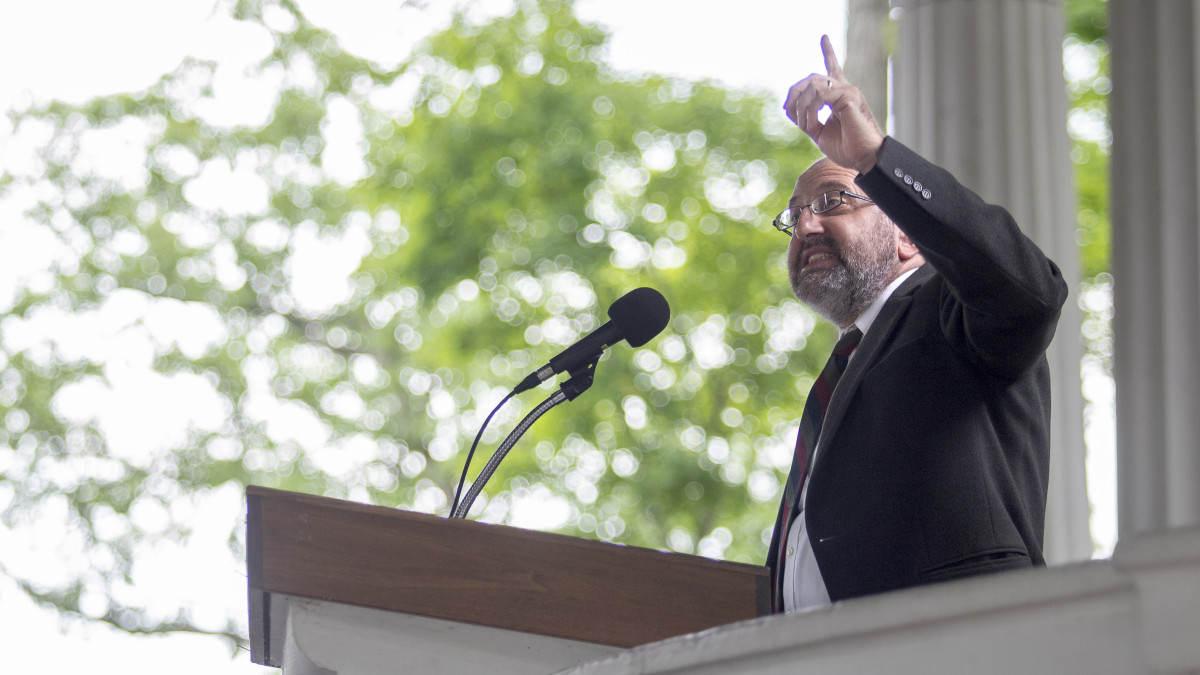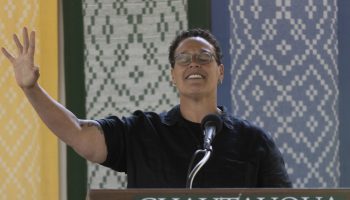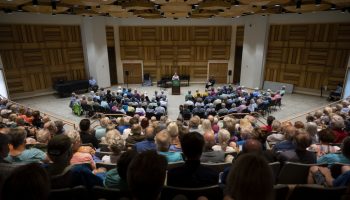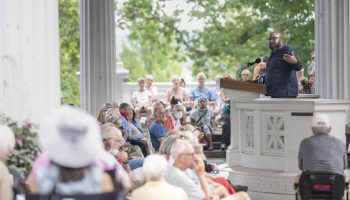The nature of democracy, which puts the power of governance in the hands of the people, requires citizens to trust each other. Yet, this current moment has been referred to as an “Era of Distrust,” with recurrent, tumultuous events chipping away at citizens’ faith in democracy.
Adam Jortner, historian, author and the Goodwin-Philpott Eminent Professor of Religion at Auburn University, spoke Wednesday, July 27, in the Hall of Philosophy, addressing, by citing history, what citizens should do to mend this distrust and enhance democracy.
His lecture, titled “The Gospel and the Ballot Box: A History,” brought a new perspective to the discussion of Week Five’s Interfaith Lecture Series theme, “The Ethical Foundations of a Fully Functioning Democracy.”
At Auburn, Jortner specializes in religion, democracy and the foundation of America. He has also authored several books and articles.
“I decided I’m going to talk to you about the history of democracy and Christianity by talking about James Madison, Jesus Christ and Joseph Stalin,” Jortner said.
Discussing the need for conversation and change by citing the term “unprecedented,” Jortner made the point that using this word can cause panic, while its antonym — “precedented” — makes people relax; neither of these reactions are ideal when trying to create positive change.
Rather than worrying about whether there is precedent, Jortner said it is important to focus on the responsibility of a citizen in a crisis of democracy.
Quoting Madison’s words from the Federalist Papers in 1787, Jortner said: “Prevailing and increasing distrust of public engagements and alarm for private rights are echoed from one end of the continent to the other. These must be chiefly, if not wholly, effects of unsteadiness and injustice with which a factious spirit has tainted our public administration.”
Madison believed that factions are dangerous, defining them as a group of people — either a majority or a minority — with a shared passion adverse to the rights or interests of a community. Factions normally form through a difference of opinion in religion, politics or a number of other areas.
Pointing to the Bible and John 8, Jortner told the story of a woman who had been accused of adultery and brought forth to Jesus. When her accusers left, as they were also sinners and could not condemn her, Jesus let the woman go.
“I hope you all can see the importance of this story about Jesus facing down a lynch mob when we are talking about the question of Christianity and democracy,” Jortner said. “Because what we have here is a political majority looking to score some points by promoting a bad idea.”
Jesus was able to work at the local level by speaking to the accused woman, and Jortner said this is a recurring theme in the Bible.
“What’s interesting is what Jesus does and does not do to restore peace and to seek justice,” Jortner said. “He speaks and he loves. He does not take over the government. He does not lead a counter mob against the Pharisees. He does not condemn the people holding the stones.”
Jortner asked why Americans now believe the government should be controlled by Christians, when this is not the example Jesus set. He hypothesized the reason comes from the believed, supernatural power of God.
“We assume that God is God because of his power, and we assume that whoever has power will use it,” Jortner said, “and that the goal of possessing power is to destroy our enemies, lay waste the ground they walk on and congratulate ourselves on our rightness.”
People often project their own characteristics and traits onto a more powerful God, Jortner said, and they must be aware of this habit and learn to epitomize the traits Jesus had that they lack. In the Bible, Jesus refrains from violence and revenge, and embodies forgiveness; yet humans struggle with integrating these values into everyday life.
Switching focus to Joseph Stalin, Jortner noted how his party’s rulings and ideologies permeated all levels of society through totalitarianism. While being in charge of political operations on a large scale, Stalin also had a role in personal decisions of people in the Soviet Union.
“As Hannah Arendt said, ‘The nature of totalitarianism is the inability to think of anything outside the party,’ ” Jortner said. “ ‘Everything must be political — our love life, our family choices, our sports — everything is predetermined by the politics of it.’ ”
Jortner used Stalin as an example of totalitarianism and autocracy, which can be interpreted as the opposite of democracy.
“Madison says there is a public good. Governments exist to serve the public good. Factions exist to compete with each other for their own good,” Jortner said. “But over and above the factions, there’s the public good.”
To combat the rise of factions coming into positions of power, Jortner said it is vital to elect officials who have a sense of common good and will act to protect the general interest of the citizens.
“Democracy itself is not the same thing as the public good,” Jortner said. “… But democracy, in Madison’s view, is a tool of the public good. The public good pre-exists the government. … Life, liberty, pursuit of happiness — these things transcend the political order.”
But to protect the common good and confront the issues of factions, Jortner said many do not know what they should do.
“When we encounter a group of people who are trying to do something wrong for political gain, to help themselves and not the public good, most of us are not able to make those people care about the public good merely by willing it so,” Jortner said. “Our worry doesn’t change the world.”
Many people in modern society use social media in an unproductive way to attempt to preserve the public good; however, Jortner believes people who truly want to preserve democracy must speak up in their local communities and figure out how to talk to people who disagree with them.
“One of the big challenges of living in a country that has become dominated by social media is that you never have to talk to someone face to face,” Jortner said. “… In other words, it is difficult to have a civil conversation with someone over a social media platform because you will never see them. … They become defined in our minds by their politics alone, and we are never able to see them as a person who exists outside of that.”
Engaging in civil conversation with someone who has different political views builds community, according to Jortner, which in turn helps build public good and serves democracy.
“Having friends and acquaintances with whom we disagree is critical, and it’s in real trouble because we have been allowed … to cut people off because of their political opinions,” Jortner said. “In other words, we say your politics has to pervade everything. I am not saying that we should ignore justice. … I’m not saying we should never get angry, but we can’t just scream into the void. We can’t just condemn and then be done with it.”
Drawing from his personal experience of running for office as a Democrat in the state of Alabama, Jortner said many people were able to hold a conversation with him, despite what their political beliefs were.
“I ran as a Democrat in a very conservative area of east Alabama. How many people said to me, ‘I won’t shake your hand’ of the 2,000 people I met? One,” Jortner said. “They didn’t agree with me. I know a lot of them didn’t vote for me. But they were able to shake my hand, and sometimes, we shared a couple of words. And to me, that was important. … It taught me that in the end, democracy is government by strangers.”
To rebuild a democracy that people trust, Jortner believes people must try to create trust in every aspect of their lives.
“When you build trust in the community, you knit things back together, and that gives the public good some strength,” Jortner said. “That can’t be done on social media, but it can be done face to face.”





